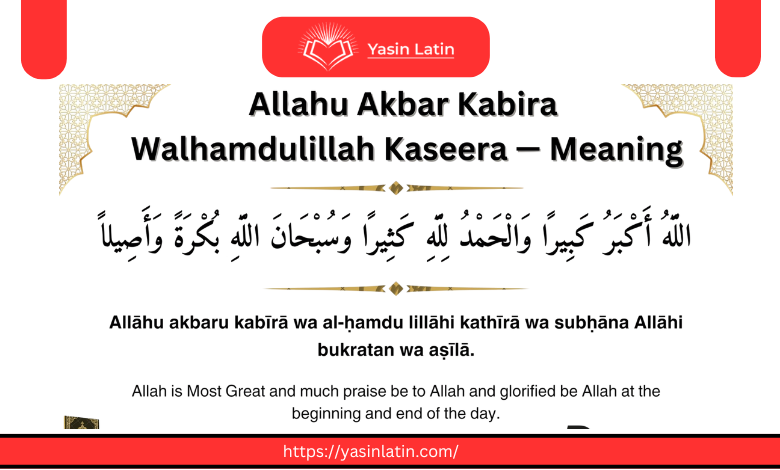Contents
- 1 The Power of Takbir: Understanding "Allahu Akbar" in Islam
- 2 What Is Takbir? Meaning and Importance in Islam
- 3 Why Is Takbir So Important?
- 4 When Do Muslims Recite the Takbir?
- 5 1. In the Five Daily Prayers (Salah)
- 6 2. During the Call to Prayer (Adhan & Iqamah)
- 7 3. In Eid Celebrations (Takbirat al-Eid)
- 8 4. During Hajj and Umrah
- 9 5. In Times of Difficulty or Joy
- 10 Takbir in Eid vs. Daily Prayers: Key Differences
- 11 Why Is Takbir Louder and More Frequent in Eid?
- 12 The Virtues and Rewards of Reciting Takbir
- 13 1. Strengthens Faith & Taqwa (God-Consciousness)
- 14 2. Earns Divine Rewards & Forgiveness
- 15 3. Brings Barakah (Blessings) in Life
- 16 4. Unites the Ummah (Muslim Community)
- 17 5. Raises Ranks in the Hereafter
- 18 The Significance of Takbir During Eid Celebrations
- 19 1. Expresses Gratitude for Allah’s Blessings
- 20 2. Reinforces Unity Among Muslims
- 21 3. Prepares the Heart for Eid Prayer
- 22 Conclusion
- 23 FAQs About Takbir
- 24 1. When should Muslims recite Takbir?
- 25 2. Is Takbir only for Eid?
- 26 3. Why is Takbir repeated in prayer?
- 27 4. Can Takbir be recited silently?
- 28 5. What is the reward for saying “Allahu Akbar”?
- 29 Surah Al-Nasr: A Comprehensive Guide to Its Meaning, Recitation, and Reflection
The Power of Takbir: Understanding "Allahu Akbar" in Islam
The phrase “Allahu Akbar” (الله أكبر)—known as the Takbir—is one of the most profound declarations in Islam. It translates to “Allah is the Greatest” and serves as a constant reminder of His supreme power and majesty.
Muslims recite the Takbir in various acts of worship, from daily prayers to major Islamic celebrations like Eid al-Fitr and Eid al-Adha. But what makes this phrase so significant? Why is it repeated so frequently in a Muslim’s life?
In this comprehensive guide, we will explore:
The meaning and importance of Takbir in Islam
When and why Muslims recite “Allahu Akbar”
The difference between Takbir in daily prayers vs. Eid
The virtues and rewards of reciting Takbir
The role of Takbir in Eid celebrations
By the end of this article, you will have a deeper understanding of how this powerful phrase strengthens faith, unites Muslims, and elevates spiritual devotion.
What Is Takbir? Meaning and Importance in Islam
The Takbir definition is the proclamation “Allahu Akbar” (الله أكبر), meaning “Allah is the Greatest.”
This simple yet profound phrase carries immense weight in Islamic teachings. It is:
A declaration of Tawheed (the Oneness of Allah)
A reminder of Allah’s supremacy over all creation
A means of seeking closeness to Allah through remembrance (Dhikr)

Why Is Takbir So Important?
Strengthens Faith – By repeating “Allahu Akbar,” Muslims reaffirm their belief that nothing is greater than Allah.
Humbles the Heart – It instills humility, reminding believers that all power lies with Allah alone.
Connects Worship to Daily Life – Whether in prayer, celebration, or hardship, Takbir keeps Allah at the center of a Muslim’s thoughts and actions.
The Prophet Muhammad (ﷺ) emphasized the importance of Dhikr (remembrance of Allah), including Takbir, in numerous Hadiths. One such narration states:
“The best remembrance is ‘La ilaha illa Allah’ (There is no god but Allah), and the best supplication is ‘Alhamdulillah’ (All praise is due to Allah).” (Sunan Ibn Majah)
Since Takbir is a form of Dhikr, it holds a special place in a believer’s spiritual journey.
When Do Muslims Recite the Takbir?
The Takbir is recited in multiple contexts, each carrying deep spiritual significance.
1. In the Five Daily Prayers (Salah)
Muslims say “Allahu Akbar” when starting Salah (Takbiratul Ihram).
It is repeated when transitioning between prayer postures (Ruku, Sujood, etc.).
This constant repetition reinforces focus and submission to Allah.
2. During the Call to Prayer (Adhan & Iqamah)
The Adhan (call to prayer) begins with “Allahu Akbar” four times.
The Iqamah (second call before prayer starts) also includes Takbir.
This signifies that responding to Allah’s call is greater than all worldly matters.
3. In Eid Celebrations (Takbirat al-Eid)
Eid al-Fitr: Muslims recite Takbir from sunset on the last day of Ramadan until the Eid prayer.
Eid al-Adha: Takbir starts from Fajr on the 9th of Dhul-Hijjah (Day of Arafah) until Asr on the 13th of Dhul-Hijjah (Days of Tashreeq).
These Takbirs are often recited aloud in mosques, homes, and public gatherings.
4. During Hajj and Umrah
Pilgrims recite Takbir during:
Tawaf (circumambulation of the Kaaba)
Sa’i (walking between Safa and Marwah)
Stoning the Jamarat (symbolizing rejection of evil)
The Talbiyah (prayer recited during Hajj) also includes phrases glorifying Allah.

5. In Times of Difficulty or Joy
When facing challenges, Muslims say “Allahu Akbar” to seek strength from Allah.
In moments of happiness (e.g., hearing good news), it is a way to thank Allah.
Even in battles throughout Islamic history, Takbir was a rallying cry for courage.
Takbir in Eid vs. Daily Prayers: Key Differences
While Takbir is recited in both daily Salah and Eid, there are notable distinctions:
Aspect | Takbir in Daily Prayers | Takbir in Eid Prayers |
Purpose | Marks transitions in prayer | Celebrates Eid and glorifies Allah |
Recitation Style | Mostly silent (except in congregation) | Loud and communal |
Frequency | Once per movement in Salah | Repeated multiple times before Eid prayer |
Public Proclamation | Not required outside Salah | Encouraged in mosques and public spaces |
Why Is Takbir Louder and More Frequent in Eid?
Expresses communal joy – Eid is a time of celebration, and collective Takbir unites Muslims.
Thanksgiving to Allah – After Ramadan (Eid al-Fitr) or Hajj (Eid al-Adha), Muslims acknowledge Allah’s blessings.
Revives the Sunnah – The Prophet (ﷺ) encouraged reciting Takbir loudly during Eid.

The Virtues and Rewards of Reciting Takbir
The benefits of saying “Allahu Akbar” go beyond mere words—it is an act of worship with immense spiritual rewards.
1. Strengthens Faith & Taqwa (God-Consciousness)
Reminds Muslims that Allah is above all worldly concerns.
Helps maintain focus on the Hereafter.
2. Earns Divine Rewards & Forgiveness
The Prophet (ﷺ) said:
“The most beloved words to Allah are four: SubhanAllah, Alhamdulillah, La ilaha illa Allah, and Allahu Akbar.” (Sahih Muslim)
Reciting Takbir is a form of Dhikr, which erases sins and elevates one’s status in Jannah.
3. Brings Barakah (Blessings) in Life
Saying Takbir in times of distress brings relief.
Uttering it in happiness increases gratitude.
4. Unites the Ummah (Muslim Community)
During Eid, millions of Muslims worldwide recite Takbir simultaneously, strengthening brotherhood.
5. Raises Ranks in the Hereafter
Consistent Dhikr, including Takbir, leads to a higher status in Paradise.
The Significance of Takbir During Eid Celebrations
Eid is incomplete without the resounding chants of “Allahu Akbar.” Here’s why:
1. Expresses Gratitude for Allah’s Blessings
Eid al-Fitr: Muslims thank Allah for the strength to complete Ramadan.
Eid al-Adha: Honors Prophet Ibrahim’s (AS) sacrifice and Allah’s mercy.
2. Reinforces Unity Among Muslims
The collective Takbir creates a powerful sense of belonging.
3. Prepares the Heart for Eid Prayer
Before Eid Salah, Muslims recite:
“Allahu Akbar, Allahu Akbar, La ilaha illa Allah, Allahu Akbar, Allahu Akbar, wa Lillah il-hamd.”
(Allah is the Greatest, there is no god but Allah, and all praise is due to Him.)
This purifies intentions and increases devotion.
Conclusion
The Takbir (“Allahu Akbar”) is much more than a phrase—it is a lifeline of faith, a source of strength, and a symbol of Muslim unity. Whether in prayer, Eid celebrations, or daily life, this powerful declaration keeps believers connected to Allah’s greatness.
By understanding its meaning and practicing it sincerely, Muslims can deepen their spirituality and draw closer to their Creator.
Want to learn more about Islamic teachings? Book a free consultation with Al-Azhar scholars today!
FAQs About Takbir
1. When should Muslims recite Takbir?
During daily prayers, Eid, Hajj, and moments of gratitude or difficulty.
2. Is Takbir only for Eid?
No, it is recited in Salah, Adhan, and other Islamic rituals.
3. Why is Takbir repeated in prayer?
To maintain focus and acknowledge Allah’s greatness in every movement.
4. Can Takbir be recited silently?
Yes, in personal prayers, but it’s encouraged to say it aloud during Eid.
5. What is the reward for saying “Allahu Akbar”?
It earns blessings, forgiveness, and elevates one’s rank in the Hereafter.
Read More >>

